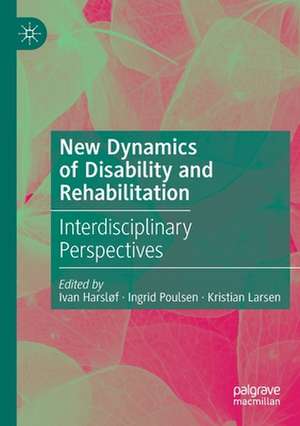New Dynamics of Disability and Rehabilitation: Interdisciplinary Perspectives
Editat de Ivan Harsløf, Ingrid Poulsen, Kristian Larsenen Limba Engleză Paperback – 14 aug 2020
This collection provides a broad coverage of recent changes in medical and vocational rehabilitation in Northern Europe. It presents analyses that cut across health sciences, medical sociology, disability studies and comparative welfare state research. Through this interdisciplinary perspective, the book explores the changing roles of patients, caregivers, professionals and institutions, and the wider implications of these changes for social inequalities in health.
What obstacles do different groups of patients encounter when negotiating the complex chains of medical and vocational services? Who decides regarding references to specialized treatments, and the provision of comprehensive and coordinated services, and different types of benefits and material support? What is the importance of the resources that patients and caregivers bring to bear in the rehabilitation process?
| Toate formatele și edițiile | Preț | Express |
|---|---|---|
| Paperback (1) | 905.17 lei 6-8 săpt. | |
| Springer Nature Singapore – 14 aug 2020 | 905.17 lei 6-8 săpt. | |
| Hardback (1) | 917.06 lei 6-8 săpt. | |
| Springer Nature Singapore – 25 iul 2019 | 917.06 lei 6-8 săpt. |
Preț: 905.17 lei
Preț vechi: 952.81 lei
-5% Nou
Puncte Express: 1358
Preț estimativ în valută:
173.20€ • 180.48$ • 143.41£
173.20€ • 180.48$ • 143.41£
Carte tipărită la comandă
Livrare economică 03-17 aprilie
Preluare comenzi: 021 569.72.76
Specificații
ISBN-13: 9789811373480
ISBN-10: 9811373485
Pagini: 328
Ilustrații: XXI, 328 p. 4 illus., 3 illus. in color.
Dimensiuni: 148 x 210 mm
Greutate: 0.42 kg
Ediția:1st ed. 2019
Editura: Springer Nature Singapore
Colecția Palgrave Macmillan
Locul publicării:Singapore, Singapore
ISBN-10: 9811373485
Pagini: 328
Ilustrații: XXI, 328 p. 4 illus., 3 illus. in color.
Dimensiuni: 148 x 210 mm
Greutate: 0.42 kg
Ediția:1st ed. 2019
Editura: Springer Nature Singapore
Colecția Palgrave Macmillan
Locul publicării:Singapore, Singapore
Cuprins
1. Introduction: New dynamics of Disability and Rehabilitation.- 2. Northern European Rehabilitation Services in the Context of Changing Healthcare, Welfare, and Labour Market Institutions: A Theoretical Framework.- 3. The Post-corporatist Rehabilitation System in Germany: High Potential, Critical Moments.- 4. From Quotas to Sanctions: The Political Economy of Rehabilitation in the UK.- 5. The Redesigning of Neurorehabilitation in Denmark and Norway.- 6. Rehabilitation as a Reformed Governance Technology: Freedom, Constraint, and Concealment.- 7. Return to Work After Severe Traumatic Brain Injury in Diverse Labour Market and Welfare State Contexts.- 8. Severe Brain Injury and Boundary Work.- 9. Conversion of Social Capital in the Rehabilitation Process of Adolescents Following an Acquired Brain Injury.- 10. Complex Problems in Need of Inter-organizational Coordination: The Importance of Connective and Collaborative Professionalism within an Organizational Field of Rehabilitation.-11. Transfer Practices during Acquired Brain Injury Rehabilitation: A Descent in the Medical Hierarchy.- 12. Rehabilitation as a Curricular Construction.- 13. Interdisciplinarity and Rehabilitation Research.
Notă biografică
Ivan Harsløf is an associate professor at Oslo Metropolitan University, working in the Department of Social Work, Child Welfare and Social Policy.
Ingrid Poulsen is a research manager at Department of Neurorehabilitation, TBI Unit at Rigshospitalet, Copenhagen University Hospital, and an associate professor at Section of Nursing Science at Aarhus University, Denmark.
Kristian Larsen is a full professor at Department of Learning and Philosophy, Aalborg University, Denmark.
Textul de pe ultima copertă
This collection provides a broad coverage of recent changes in medical and vocational rehabilitation in Northern Europe. It presents analyses that cut across health sciences, medical sociology, disability studies and comparative welfare state research. Through this interdisciplinary perspective, the book explores the changing roles of patients, caregivers, professionals and institutions, and the wider implications of these changes for social inequalities in health.
What obstacles do different groups of patients encounter when negotiating the complex chains of medical and vocational services? Who decides regarding references to specialized treatments, and the provision of comprehensive and coordinated services, and different types of benefits and material support? What is the importance of the resources that patients and caregivers bring to bear in the rehabilitation process?
Caracteristici
Fills a gap by extending rehabilitation trajectories from initial hospitalization and acute treatment to general rehabilitation through to vocational reintegration, the encompassing coordination of health and social services, and cross-cutting organizational and institutional structures Provides a valuable resource for researchers and professional bodies in the fields of medical and vocational rehabilitation Offers interdisciplinary perspectives by gathering together leading scholars and clinical professionals to provide practical relevance
